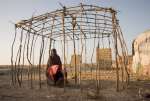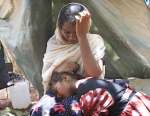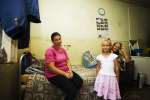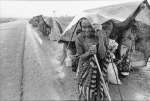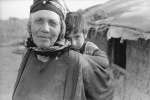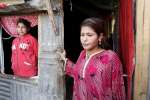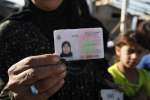- Text size
 |
|  |
|  |
| 
- Français
Q&A: Grim reality of honour killing brought to the screen
News Stories, 30 September 2010
OTTAWA, Canada, September 30 (UNHCR) – Former refugee Nelofer Pazira's latest feature, "Act of Dishonour," presents the grim reality of honour killing in Afghanistan, where she grew up before fleeing with her family in 1989. The award-winning Afghan-Canadian director's film, which was shot in an abandoned village in Tajikistan, also draws on some of Pazira's own experiences and it examines the challenges faced by refugee families returning to the complexity and volatility of modern Afghanistan. UNHCR provided some help during the making of the film for scenes involving refugees. Pazira, star of the 2001 film "Kandahar" and co-director of the 2003 documentary "Return to Kandahar," is on an international tour to promote the film. She spoke recently to UNHCR Public Information Assistant Gisèle Nyembwe. Excerpts from the interview:
Tell us about the film and why you made it
"Act of Dishonour" is about honour killing. It is based on the true-life story of a woman who acted in a short film that one of my friends made in Kabul. Her husband was in Pakistan at the time of the filming, but he returned to Kabul as the crew celebrated the completion of filming. He shot his wife dead because she had left her home and had acted in a film.
Marina Golbahari, who plays the lead in "Act of Dishonour," faces similar pressures in her own life. She is among a growing number of women in Afghanistan who remain utterly committed to cinema and who brave threats to appear in films. During my research and subsequent writing of the script, I heard from these women, again and again, that they hoped the world see the reality of their lives through this film.
But the film opens with a young boy shooting an older man. It's a revenge killing. I have added this because honour killing is an issue that is not just related to women. Honour and revenge are overriding priorities in this culture. Yet the film is also about forgiveness. The young bus driver who had avenged his father's death wants to spare the life of his fiancée – the woman he believes has betrayed him. There is also a story of a refugee family returning to their village to find that their home has been taken.
What message did you want to convey to viewers?
Having grown up in Kabul and then emigrated to Canada, I live on the border of two different cultures – Afghan and Canadian – and I am very much a product of both. To this end, I wanted to condemn honour killing as well as examine the very idea of honour. Originally, I wanted to do this in book form, but in 2003 I decided that film was the best way to tell this story. Images travel faster than the written word, crossing geographical, tribal and cultural borders.
But it was important to do more than just condemn honour killing and the suffering of women. I wanted to understand the psychology behind it, to understand men who are forced by the traditions of their community – and by their own failures – to murder those they love.
Did you cast any refugees in the film?
Most of the cast members in "Act of Dishonour" are not professional actors. I liked the challenge of working with them. I was searching for people whose real-life stories mirrored aspects of my characters. I wasn't just basing the characters on real-life people, but wanted to find people who could bring their own stories to the script. One actor, for example, was a refugee in Iran who returned after 26 years of exile. He found out at first hand that it wasn't easy to return to his home town in [eastern Afghanistan's] Wardak province. There are Afghan refugees that live in Tajikistan, near the Afghan-Tajik border and in other areas. A number of these refugees came and helped on the film set – either in front of or behind the cameras.
I played the role of Mejgan, based on my own experience filming in Afghanistan over the past decade. Trapped between embarrassment and idealism, I was struggling to show how Afghans could be progressive. During the filming of Kandahar, we discovered the difficulty of finding women willing to take part in the film. I was constantly ashamed of the backwardness of my own culture. At the time, I was trying to persuade Afghan village women to help me prove that Afghans could be as cultured as anyone else.
Fortunately, we didn't have tragic endings like the fate of Mena in "Act of Dishonour." But we had terribly sad situations where young women were prevented from returning to the film set out of fear. Gradually, I started understanding the culture that once caused me such embarrassment. I developed more sympathy for women and men in that country. Working with foreign film crews enabled me to experience their Western naivety about the Muslim world and the one-dimensional way in which they judged others.
Do you think people will relate to the film?
Stories of honour killings have become commonplace . . . I recall another incident [of honour killing] in 2001, when I returned to the region to act in "Kandahar," which was filmed along the Iran-Afghanistan border. We worked mostly in refugee villages. A teenage girl loved being on the set. We had filmed a few scenes with her as one of the four wives of a man in the film. But one day she fled the set for fear of being seen by her father and her two younger brothers. She was severely beaten by her father for dishonouring his name. We had to throw away the footage and start again.
Today, in various parts of the world, women are faced with all sorts of violence – crime of honour is just one. Crime of honour is not restricted to the Muslim world. A number of honour killings in recent years have been carried out in the Western world – sadly mostly among refugee families. They had escaped war, atrocities and yet, after arriving in a safer environment, the gap between their practices and those in their new home become obvious. The burden is often placed on women to safeguard their families' name and honour.


